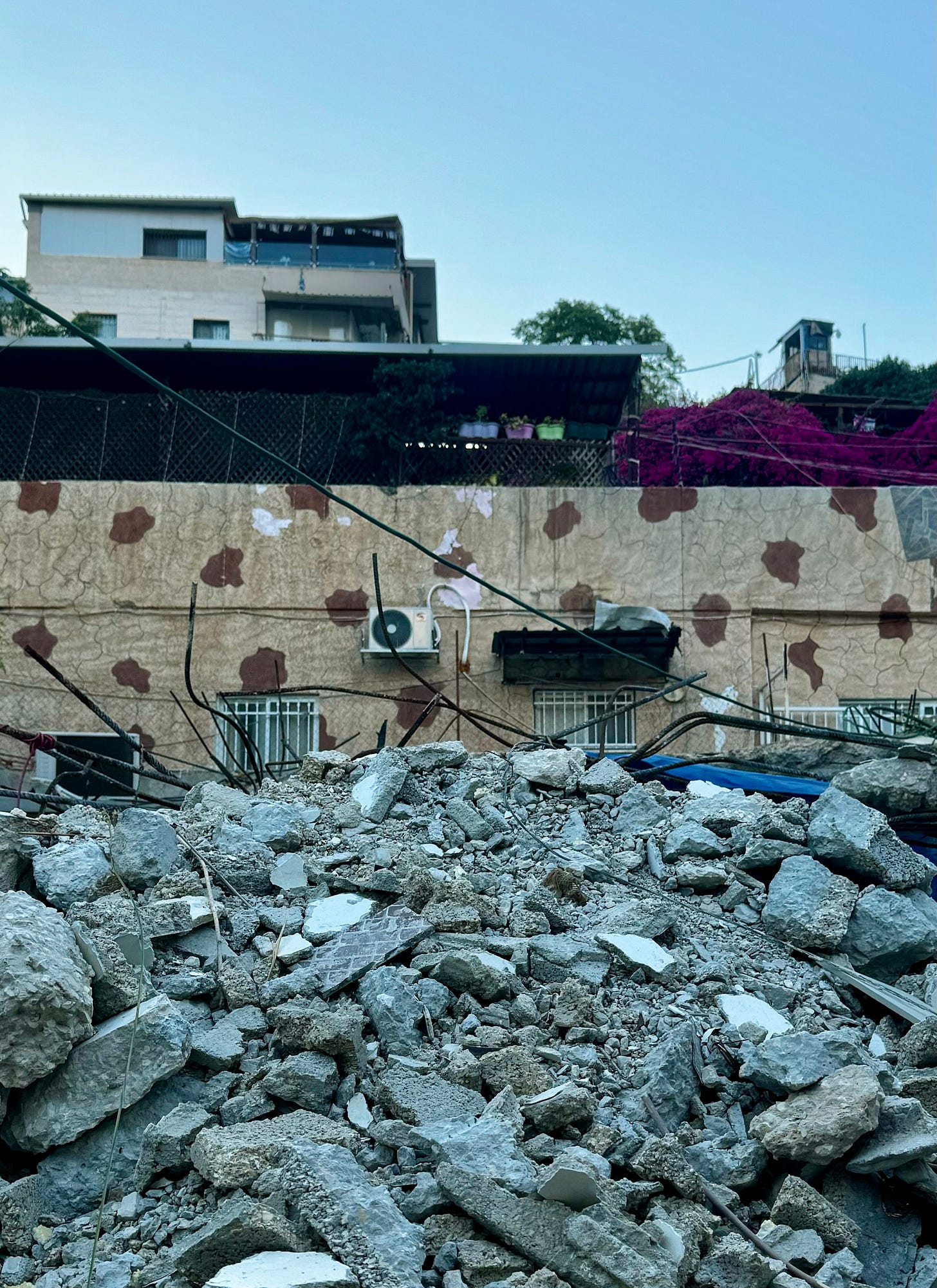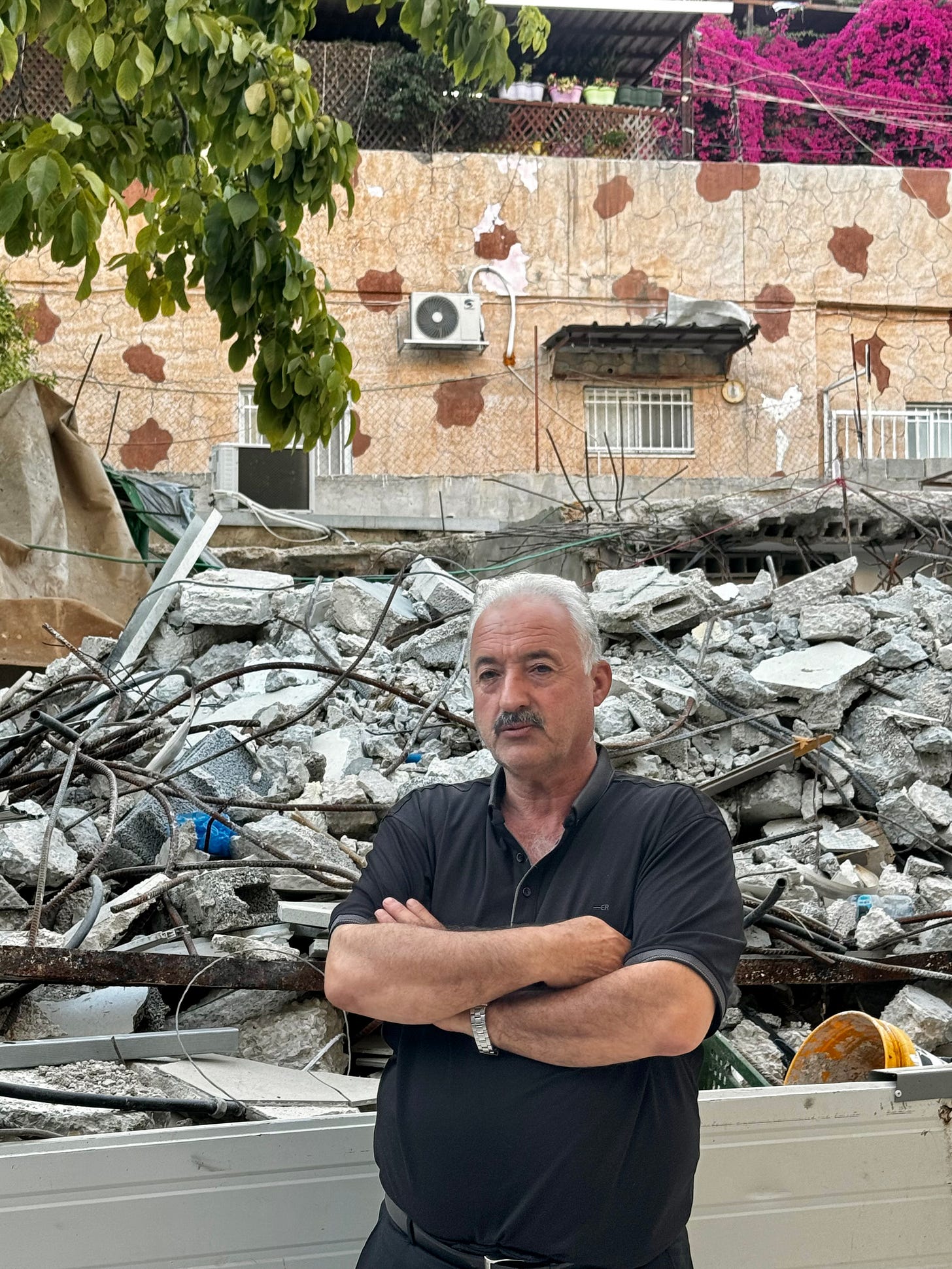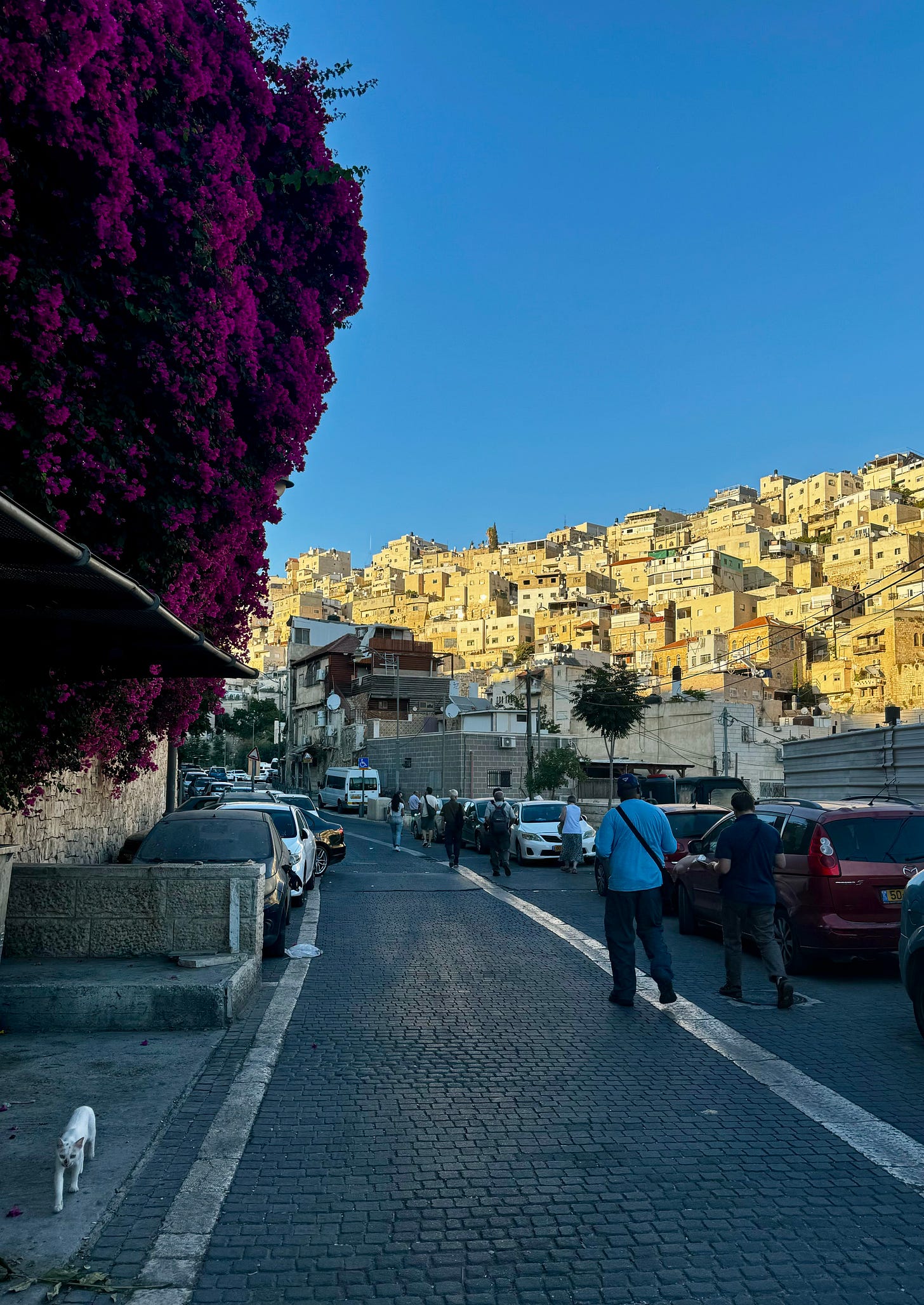I have so many stories to share concerning my recent visit to the West Bank and Gaza border. The news has been full lately (the siege/destruction of Jenin and other villages in the West Bank, the discovery of six murdered hostages in Rafah, and more). I want to comment on these, but I am also obligation to witness to what I saw in the West Bank just a few weeks ago. I shared about some of the events in this recent webinar, if you’d like an overview. But there are many stories left to share and I want to go deeper.
I recently shared about Alice Kisiya and the eviction of her family from their home in the Makhrour Valley (outside of Bethlehem) to make room for a newly legalized settlement. This is not an isolated incident, but a pattern in the Occupied West Bank and East Jerusalem, where Palestinians are evicted from their homes and squeezed into smaller, crowded areas. You’ll also see a pattern of Palestinian homes being demolished in these areas. Many in the Netanyahu government are not shy about their goal: they want Jewish ethnic/religious hegemony that is segregated from non-Jews (at best) and the ethnic cleansing of all Palestinians from the land altogether (a more extreme view, but with growing numbers).
Home demolitions and the threat of home demolitions hang over East Jerusalem, where only 1-3% of Palestinian requests to build new homes or expand existing homes are approved annually. The result is a great shortage of housing units for Palestinians. There are over 23,000 demolition orders for Palestinian families in East Jerusalem who have “illegally” expanded their homes to accommodate growing families or built a new home on their own property. These families never know when and if the Israeli army will enforce the demolition, and so they live in great stress and insecurity. (See: Israel’s home demolitions a ‘war on nerves’ for Palestinians).
Here is one such story about a man--Fahkri Abu Diab, the elected spokesman for the 60,000 Palestinian residents of Silwan, an ancient neighborhood just outside the walls of the Old City--whose home was demolished on Valentine’s Day, 2024.
A few weeks ago, I saw the rubble of his home. I ate a delicious meal prepared by his wife in the shadow of that rubble. I saw his fruit trees, his chickens and ducks, and the large, elegant clock that his mother purchased when she made hajj to Mecca many decades ago--dented and broken, extracted from the rubble and hanging from a jagged piece of cement where the kitchen used to be.
“In this area, I can almost smell my mother,” he told us, standing in the oldest portion of the house that was still partially standing.
This is the house that he was born in, the house his parents moved into as newlyweds in the 1930’s, during the British Mandate. Next to the mountainous, grey corpse of his family home is a new, tiny house, constructed of caravan/trailer material which he built and moved into after the destruction of his family home.
It was a family home--not just to Fakhri and his wife, but home their children and their families—ten people in all. It contained the memories of four generations of the Abu Diab family.
“My grandchildren played in the yard,” he said, motioning to a battered tricycle extracted from the rubble. “We used to have a big family dinner together every Friday night. Now, they are scattered across the city, living in overpriced, crowded apartments. We lost the special togetherness that we shared as a family, and that is the hardest part of all.”
Silwan is composed of six neighborhoods, including the al-Bustan neighborhood where Fakhri lives, where a large percentage of demolition orders have been issued to make way for settlers. The settler goal for Silwan is to build a touristic/archeological park which will enforce Jewish hegemony and narrative control of the area.
Why Silwan?
Silwan’s blessing, and its curse, is that it grew up alongside ancient water sources. If you know the New Testament, you’ll recall the story of the man who was born blind, whose eyes Jesus covered with mud made from his own spit. Jesus told him to wash his eyes in the pool of Siloam. After washing in the pool, the man could see. Silwan is the general area where the pool of Siloam used to be, buried under layers of 2,000 years of history.
Because of its connection to Second Temple-era Judaism, Silwan is one of the largest Palestinian areas in East Jerusalem at risk of mass displacement.
Indeed, above Fakhri’s home are several settlement houses from which Palestinians have been evicted, decked with Israeli flags and a small watchtower overlooking the other residents of the neighborhood.

Fakhri himself had a pending demolition order on his home after he expanded it decades ago to make room for his offspring. (It is the tradition in Arab culture for families to expand homes and stay together, it has been this way for centuries across the Middle East).
As an outspoken advocate for his beleaguered community, he has hosted many international government leaders and dignitaries through the years; including Jimmy Carter and the Elders group. He’s hosted ambassadors from Mexico and Brazil.
To all these men, he shared the vulnerability of residents of Silwan, the frequent home demolitions, the stress of living in all the uncertainty. He was always advocating for others, those whose homes had already been demolished or were about to be demolished.
But then, his home was demolished.
Fakhri was issued an order commanding him to demolish his home by Jan 31, 2024. He refused, appealing for a delay, appealing for a reversal, citing his health and other concerns. (Who has the stomach to rent a wrecking ball and pay for the demolition of their own home?)
About a week before the deadline, he hosted US Deputy Assistant Secretary of State for Israeli and Palestinian Affairs, Andrew Miller. Miller assured Fakhri that his home would not be demolished.
Just a few weeks later, at 8 a.m. on February 14, 2024, a group of masked Israeli officers in riot gear and drawn rifles blew open in his gate and entered his home. They were accompanied by aggressive dogs. Fakhri and his wife, who were still in bed, were immediately forced to exit the house. “They didn’t even let us take our clothes or our memories--our family photos,” he told us. “I asked them, can you at least give us five or ten minutes to collect a few precious things?” but the soldiers would not. “Now, I have one photo left of my mother.”
Why Fakhri? Why now?
“This was vengeance against me since I am an activist against home demolitions. They told me to my face that the demolition was revenge. They want me to be silent. They want to strike fear into the rest of the neighborhood, that if they can do this to me, absolutely nobody else is safe and nobody else dare speak up about what is happening here, or they will suffer the same fate.”
Indeed, not long before his home was demolished, both Fakhri and his wife were arrested. His wife was held in jail for two days and Fakhri four days, handcuffed with a bag over his head the entire time.
He was never given a reason why. “To this day they have not stated what crime I committed, other than the crime other than defending my neighborhood. They said that my activities make my whole family a danger to the people of Israel. So, when my granddaughter asked me why I was arrested and if I was a criminal, how was I supposed to answer her?”
“After the demolition I am a different person. My family is scattered, and we don’t see each other as we used to. I want to stay here but my wife wants to leave because it hurts too much to look at our demolished home. And I want to be clear—Israelis are not my enemy. Just this morning, I was visited by Rabbis for Human Rights. My problem is that the settlers want to replace us. Just because you feel connected to someone who lived here thousands of years ago does not give you the right to demolish our home.
“But, they are not going to break me. Despite what they have done to me, I will continue to speak out and teach my community in nonviolent action to defend their rights. I am proud to be a person who speaks and defends others, despite the price. I still have dreams. I want to rebuild and turn my old home into an office that works against demolitions, a place where diplomats and world leaders can gather to put pressure on the Israeli government. It is not just my home I am defending—it is the whole neighborhood, all of East Jerusalem. Help us put pressure on them, so this insanity ends. All of this is happening in a generation when it is streamed live, and no one holds Israel accountable. After the demolition, I spoke with Andrew Miller, who told me ‘Israel is above the law.’”
Shortly thereafter, Miller resigned from the Biden Administration.
The family cistern in the yard was also demolished. And one more pending demolition remains (in September) for the older part of the house which is still partially standing. For the first demolition, Fakhri was sent a bill of $30,000 shekels (over $8,000).
“They even billed me for the food the officers ate while demolishing my home. They billed me for the dogs that they brought with them. And though my home is destroyed, I still have to pay taxes on the rubble.”
Omar Haramy, our guide added some closing thoughts.
“In Palestine we are all treated as though we are all guilty. We have to prove our innocence. Prove to me that this shirt is yours. Prove that this is your backpack. Ah, you don’t have the receipt?! Oh, you do! Find me the vendor who gave it to you. Prove that you’ve been here for centuries. Get lots of paperwork with the signatures of every neighbor proving that you own this land. Oh, but you are missing two signatures!”
--
As we ate the delicious meal that Fakhri’s wife, Amina, prepared for our group (savory lentil soup and perfectly seasoned mjaddara along with many side salads) the evening turned to night and the stars came out over Silwan. I wandered through his yard, looking at the fruit trees, engaging with the ducks (they hissed at me), and trying to imagine what it looked like in the ‘30’s when Fukhri’s mother moved from a different part of Silwan to join her husband in their new home. I thought of the changes the family and neighborhood has seen through the years. I thought about his lifetime of defending the neighborhood from ethnic cleansing. And I also thought about Jesus, and the man born blind who received his sight in this very area.
Like all of Palestine and Israel, a land filled with Bible stories, it seems like there is a lesson hovering beneath the surface every place you go. But most people are content with the old stories and do not apply their ethical weight to the modern context. They do not enter into the theological conundrum.
Jesus, merciful Jesus, healed a man who was born blind by gathering some of this Silwan dirt. Spitting into it, he made a mud poultice which he applied to the blind eyes. What a strange thing to do. Usually, he just touched people, declaring that their faith healed them. Sometimes he healed them with just a word. So, why the spit? Why the dirt? (There’s another story of Jesus healing a blind man with his spit. As far as I know these are the only miracles with spit, and both of them are connected to blind men).
There must have been a lesson Jesus was trying to teach by healing the man this way. I think maybe it also had something to do with the dirt and spit together, almost a mini-recreation act when God fashioned the human from the earth and blew his own moisture-breath into the him and the human became a living being. It was earth and something from within God mixed together that first animated us, and that reanimated the blind man.
The spit, coming from his mouth also seems that it could represent the word of God.
All through the scriptures, God is entreating us to open our eyes. He declares how injustice blinds us:
Do not pervert justice or show partiality. Do not accept a bribe, for a bribe blinds the eyes of the wise and twists the words of the innocent. Deuteronomy 16:19
He also declares that the knowledge of his word will open blind eyes and deaf ears.
Here, where Jesus opened the eyes of a man born blind, I cannot help but think that in one sense the blind man represents all of us, especially those who hear the Word but miss its meaning. Those of us who are born into deeply religious traditions are perhaps most likely to be “born blind” than others. And the Lord has knows that. He has mercy on that and will heal it, but it is sometimes a “harder” healing requiring the direct application of his words to our eyes—in a way that might not be comfortable for us, even offensive. And as always, he waits for us to first notice our blindness and ask him for help.
Others become clearer of vision as they do justice and mercy. Like our friend Fakhri.
The old pool has long since dried up, but I know the Lord can still heal the eyes Silwan. All of its residents.

Will you pray with me and act with me for justice on behalf of those whose homes are being systematically taken from them?
And will you pray with me for the word of truth to open all of our eyes, even from this story? May these words become living words
Then will the eyes of the blind be opened
and the ears of the deaf unstopped.
Then will the lame leap like a deer,
and the mute tongue shout for joy.
Water will gush forth in the wilderness
and streams in the desert.
The burning sand will become a pool,
the thirsty ground bubbling springs.
In the haunts where jackals once lay,
grass and reeds and papyrus will grow.
And a highway will be there;
it will be called the Way of Holiness;
it will be for those who walk on that Way.
The unclean will not journey on it;
wicked fools will not go about on it.
No lion will be there,
nor any ravenous beast;
they will not be found there.
But only the redeemed will walk there,
and those the Lord has rescued will return.
They will enter Zion with singing;
everlasting joy will crown their heads.
Gladness and joy will overtake them,
and sorrow and sighing will flee away. Isaiah 35:5-10
Amen.
Learn more:
US blasts Israel for home demolition of Palestinian activist in East Jerusalem
Palestinian activist Fakhri Abu Diab’s home demolished by Israeli forces
Prominent Palestinian Activist’s Home Bulldozed as Demolitions Spike in Jerusalem







